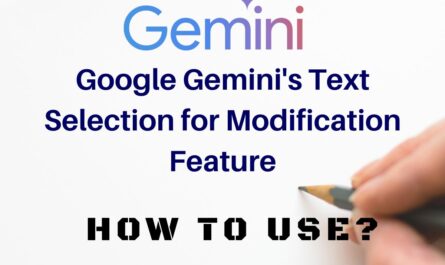Are you looking to create content with Google Gemini? In this blog, you’ll discover a variety of example prompts and detailed steps for crafting them.
Whether you’re blogging, writing emails, paraphrasing, crafting stories, essays, or generating content for business and social media, the Google Gemini AI tool makes it easy to produce high-quality content.
Writers often struggle with inspiration and organization when faced with a blank page. Google Gemini’s prompts offer targeted suggestions that can kickstart the creative process, making it easier to overcome writer’s block. The ability to access tailored prompts means writers can focus on refining their message rather than getting caught up in the initial brainstorming phase.
Using Google Gemini prompts not only saves time but also elevates the standard of writing.

20 Google Gemini Prompts Example Templates
- Product Review: “Write a review for [Product Name], focusing on its features, pros, and cons.”
- How-to Guide: “Create a step-by-step guide on how to use [Tool/Software].”
- Listicle: “List the top 10 benefits of [Topic]. Provide brief explanations for each.”
- Trending Topic: “Discuss the implications of [Current Event] on [Industry].”
- Case Study: “Outline a case study demonstrating the success of [Business] in [Specific Area].”
- Interview Format: “Conduct an imaginary interview with [Expert/Influencer] about [Topic].”
- Comparison Post: “Compare [Product A] and [Product B] in terms of features and pricing.”
- Social Media Post: “Draft a social media post promoting [Event/Product]. Make it engaging.”
- Opinion Piece: “Write an opinion article on [Controversial Topic] with supporting arguments.”
- FAQ List: “Create a list of frequently asked questions about [Service/Topic].”
- Email Newsletter: “Design an email newsletter for [Audience], covering [Topics].”
- Tips and Tricks: “Share 5 quick tips for [Activity/Skill]. Keep it concise.”
- Step-by-step Process: “Explain the process of [Task] in five easy steps.”
- Myth Busting: “Debunk five common myths about [Topic], providing factual information.”
- Guest Blog Request: “Draft an email requesting a guest blog post from [Blogger/Influencer].”
- Travel Guide: “Write a short travel guide for [Destination], highlighting key attractions.”
- Industry Trends: “Discuss emerging trends in [Industry] for the upcoming year.”
- Visual Content Idea: “Suggest five ideas for infographics on [Topic].”
- Event Recap: “Summarize key takeaways from [Event/Conference].”
- Resource List: “Compile a list of top resources for learning about [Skill/Topic].”
Types of Google Gemini Prompts
Google Gemini offers a variety of prompts designed to enhance content creation. Each type serves a specific purpose and caters to different writing needs.
- Informative Prompts
These prompts focus on delivering facts and data. They guide the writer to provide clear and concise explanations on various topics. - Creative Prompts
Designed to inspire imagination, these prompts encourage storytelling and innovative ideas. They are useful for drafting narratives or brainstorming concepts. - Persuasive Prompts
These prompts aim to convince the reader of a particular viewpoint. Writers use them to structure arguments effectively. - Descriptive Prompts
Encouraging detailed observations, these prompts help writers paint vivid pictures through words. They are ideal for building immersive experiences. - Analytical Prompts
These prompts require deep thought and evaluation. Writers analyze information, making connections to enhance understanding. - Instructional Prompts
Focused on teaching, these prompts guide the writer to create “how-to” content. They are effective for tutorials and step-by-step guides.
By utilizing these various prompts, content creators can enhance their writing process. Each type serves to improve clarity, creativity, and overall effectiveness in communication.
Emerging Trends in Content Writing with Gemini Prompts
Gemini prompts are reshaping content writing by enhancing creativity and efficiency. They leverage advanced AI capabilities to generate ideas and streamline the writing process.
Key Trends:
- Personalization: Gemini prompts can tailor content to specific audiences, improving engagement. Writers can input demographic data to receive customized suggestions.
- Idea Generation: They assist in brainstorming, providing unique angles for topics. This can help overcome writer’s block.
- Enhanced Research: Gemini prompts can summarize complex information, making it easier for writers to gather insights quickly. This saves substantial time in the research phase.
- Automated Editing: The tool aids in proofreading and editing, ensuring clarity and grammatical accuracy in the content. This allows writers to focus more on creative aspects. There is another text modification feature in Gemini that allows us to replace a word or just part of the generated content.
Advantages of Using Gemini Prompts:
- Improved Efficiency: Writers can produce content faster with suggestions at their fingertips.
- Consistency: Gemini maintains a consistent tone and style across all pieces, crucial for brand identity.
- Cost-Effectiveness: Utilizing AI for content creation can reduce expenses related to hiring additional writers or editors.
Incorporating Gemini prompts into the writing process represents a significant advancement, making content creation more dynamic and accessible.
Best Practices for Blog Content Writing with Gemini Prompts
Effective blog content writing with Gemini prompts involves understanding the target audience, establishing clear objectives, creating compelling headlines, and optimizing for search engine visibility. These strategies can significantly enhance content quality and engagement.
Identifying Your Audience
Determining the audience is fundamental to successful content writing. Writers should start by creating detailed audience personas that include demographics, interests, and pain points. This helps tailor messages that resonate with specific readers.
Utilizing tools like Google Analytics can provide insights into audience behavior. Engaging with social media platforms also offers a direct line to audience needs and preferences. By knowing who they are writing for, content creators can craft precise messages.
Create prompts that inform the AI Tool that the content is to be made for these specific type of audience.
Example Blogging Prompts for Google Gemini
- “Generate 10 unique blog post ideas for a travel blog that highlights hidden and lesser-known destinations.”
- “Create a blog post on the Topic Vertical Gardening at home”
- “Craft a detailed step-by-step guide for learning a new skill, including personal stories and experiences.”

Crafting Engaging Headlines
Headlines are the first point of contact with the audience, making them vital for capturing attention. Writers must focus on creating headlines that are both informative and intriguing.
Using powerful action words and incorporating relevant keywords can enhance headline effectiveness. For example, a headline like “Unlock Your Potential: 5 Strategies for Success” draws interest while conveying value.
Create prompts so as Google Gemini can give you different variations for the headline and you can choose the best among them.
Google Gemini Prompt Examples for Various Content Types
Blog Posts
- “Write a blog post about [topic] that covers [specific aspect].”
- “Create a step-by-step guide on how to [process or task].”
- “Explain the benefits of [product/service] in [industry or niche].”
- “Discuss common myths about [topic] and the truth behind them.”
- “Write a comparison post between [Product A] and [Product B].”
- “Create a list of the top 10 [items/tools/strategies] for [goal].”
- “Share expert tips for [achieving a goal] in [industry].”
- “Describe the impact of [current event/trend] on [industry].”
- “Explain how [technology/tool] is changing [industry].”
- “Write a blog post on [seasonal topic] and its relevance to [audience].”
Social Media
- “Craft a Twitter thread explaining [concept] in simple terms.”
- “Write an Instagram caption that promotes [product/service] with a call to action.”
- “Create a LinkedIn post discussing the importance of [topic] for professionals in [industry].”
- “Generate a Facebook post that asks a question to engage followers on [topic].”
- “Write a TikTok script that educates viewers on [subject] in under 60 seconds.”
- “Create a Pinterest pin description for [content type] about [topic].”
- “Draft a YouTube video title and description for a video on [topic].”
- “Write a poll question for Twitter that sparks discussion on [topic].”
- “Generate a series of Instagram Stories to promote [event/product].”
- “Create a LinkedIn article on [topic] that showcases your expertise.”
Email Marketing
- “Write an email subject line that encourages [audience] to open an email about [topic].”
- “Draft a welcome email for new subscribers to your [newsletter/blog].”
- “Create a promotional email for [product/service] with a clear call to action.”
- “Write a follow-up email to re-engage customers who haven’t interacted in [time period].”
- “Craft an email newsletter summary that highlights the key points of [recent blog post or update].”
- “Write an event invitation email for [type of event] happening on [date].”
- “Create an email sequence for a product launch of [product].”
- “Draft a thank-you email to send to customers after they purchase [product/service].”
- “Write an email offering a discount on [product/service] with an urgency-driven call to action.”
- “Create a customer feedback request email for [service/product].”
Video Content
- “Generate a script outline for a YouTube video on [topic].”
- “Write a video introduction that grabs the audience’s attention on [subject].”
- “Create a video tutorial script for [tool/process] in [industry].”
- “Draft an outro for a video encouraging viewers to [subscribe/comment/share].”
- “Write a product demo script highlighting the key features of [product].”
- “Create a video series outline covering [comprehensive topic].”
- “Draft a voiceover script for a video ad promoting [product/service].”
- “Write an educational video script that explains [concept] to beginners.”
- “Create a motivational video script on [topic] for [specific audience].”
- “Draft a video script for a brand story about [company/brand].”
Ebooks/Guides
- “Write a chapter outline for an ebook on [topic].”
- “Draft an introduction for a guide on [topic] aimed at [audience].”
- “Create a checklist for [process/task] to include in an ebook.”
- “Generate content for a troubleshooting guide on [common problem in industry].”
- “Write a conclusion for an ebook that encourages readers to take [specific action].”
- “Create a FAQ section for an ebook on [topic].”
- “Draft a case study to include in a guide about [topic].”
- “Write a resource list for readers to explore further on [topic].”
- “Generate a glossary of terms for an ebook on [subject].”
- “Draft a workbook section for [topic] with exercises and prompts.”
If you want to know more about how to use the Google Gemini as a beginner, watch the below video tutorial:
Ethical Considerations in Using Google Gemini Prompts
Using Google Gemini prompts in content writing raises several ethical considerations.
1. Originality and Plagiarism
Writers must ensure that the content generated is original. Relying heavily on prompts may lead to unintentional plagiarism if similar phrases or concepts appear in existing works.
2. Representing Information Accurately
Content creators have a responsibility to verify the accuracy of the information generated. Misrepresentation can lead to misinformation, affecting audience perception and trust.
3. Bias and Fairness
AI systems can reflect existing biases present in their training data. Content writers should be vigilant in identifying and mitigating any biased outputs generated by the prompts.
4. Transparency
It is important for writers to disclose the use of AI tools. Readers should know when they are engaging with content that has been generated or influenced by AI technology.
5. Copyright Issues
Understanding copyright laws is crucial. Writers should be aware of how prompts may intersect with copyright, especially if they incorporate proprietary data into their outputs.
6. Accountability
Writers must take responsibility for the results produced by using Google Gemini prompts. They should critically evaluate and edit AI-generated content to ensure it meets ethical standards and aligns with their values.



